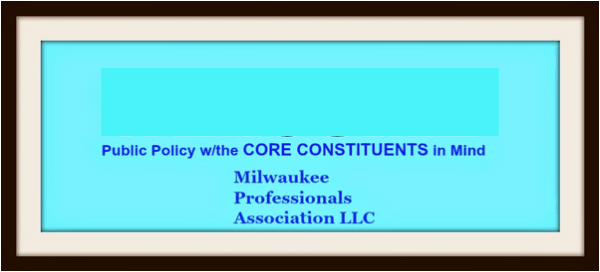
MILWAUKEE (MPA-PPR) - Sunday Review - Affordable Health Care Act implementation in Wisconsin - Today is the Benchmark date for Affordable Health Care - September 30, 2012.
September 30, 2012 is the "soft" date of the "essential benefit" benchmark for the states in the Affordable Health Care Act, both inside and outside market reforms.
=========================
Affordable Health Care Act - Full Implementation by January 1, 2014
What does that mean? It means that according to federal law, the individual mandate says each Wisconsinite should have qualified health care insurance coverage. It means Health Care Exchanges should be in place and covering various items with specific and/or uniqueness of coverage that the law requires - reforms, benefits, pre-empted state laws, exceptions, actuarial value (bronze-silver-gold-platinum-catastrophic plan), medicaid expansion, reinsurance (3-year program/millions of $$), risk corridors, risk adjustment, subsidies, individual/employee mandates, co-op and multi-state plans.
For example, for those folk with up to 400% below poverty, there are subsidies; however, the subsidies are of no value if the exchanges (products for coverage) are not in place. This means the "in-house exchange" and outside market reforms are necessary.
What are the rates, plans?
What are the requirements - procedures and processes for coverage?
Exchanges
There are three (3) Exchange options of leadership in the Affordable Health Care Act. They are:

Education/Info Sharing
What are the market reforms that must be known by the state, insurance carriers and Wisconsinites? They include:
====================
Most of the information of this article was taken from a briefing given by Brian Webb, Manager of Health Policy & Legislation, National Association Insurance Commissioners.
Stay tuned.
September 30, 2012 is the "soft" date of the "essential benefit" benchmark for the states in the Affordable Health Care Act, both inside and outside market reforms.
=========================
Affordable Health Care Act - Full Implementation by January 1, 2014
What does that mean? It means that according to federal law, the individual mandate says each Wisconsinite should have qualified health care insurance coverage. It means Health Care Exchanges should be in place and covering various items with specific and/or uniqueness of coverage that the law requires - reforms, benefits, pre-empted state laws, exceptions, actuarial value (bronze-silver-gold-platinum-catastrophic plan), medicaid expansion, reinsurance (3-year program/millions of $$), risk corridors, risk adjustment, subsidies, individual/employee mandates, co-op and multi-state plans.
For example, for those folk with up to 400% below poverty, there are subsidies; however, the subsidies are of no value if the exchanges (products for coverage) are not in place. This means the "in-house exchange" and outside market reforms are necessary.
What are the rates, plans?
What are the requirements - procedures and processes for coverage?
Exchanges
There are three (3) Exchange options of leadership in the Affordable Health Care Act. They are:

- State Exchange.
- operated by the state
- may operate risk adjustment
- determine eligibility for subsidies
- Federal Facilitated Exchange (if the state refuses the US GOV HHS will make the decision and operate the Exchange
- Partnership Exchange
- HHS operate Exchange
- state makes key decision, does plan management and some consumer assistance
Education/Info Sharing
What are the market reforms that must be known by the state, insurance carriers and Wisconsinites? They include:
- guarantee issues
- rating issues
- essential benefits
- no annual limits
- no life-time limits
If the state refuses to participate as a state-ran or partnership exchange, the exchange will be ran by the federal government.
The Governor of Wisconsin has made it known that he was not going to participate in the Affordable Health Care mandate until after the November 6, 2012, the presidential election, to take action.
Each state has 10 days after the November 6, 2012 election to declare its position. However, based on the blueprint, 42 actions are required by the state to be a state exchange and 19 actions to be a partner. To be in compliance, many of the steps need to be completed before the 2012 presidential election.
So, the lack of leadership by our state government, puts the citizenry of Wisconsin on a collision coarse with "un-preparedness" January 1, 2014.
- September 30, 2012 - Essential Health Benchmark
- November 16, 2012 - Applications Due
- January 2013 - HHS Certifies State Exchanges
- October 2013 - Initial Open Enrollment Period
- January 2014 - Exchange Coverage Effective
- Establishment Grants - Available through 2012
The above are some points the citizenry (residential and commercial) of Wisconsin need to be about the business of "right-now" contact with:
- Your individual legislators office (senator and representative)
- Governor Scott Walker
- Secretary Ted Nickel - Office of Commissioner of Insurance
- Secretary Dennis Smith - Department of Health Services
- Secretary Reggie Newson - Department of Workforce Development
Benchmark - Essential Health Benefit
Did the state of Wisconsin meet the September 30, 2012 benchmark for the issuers in the individual and small group markets for essential health benefits?====================
Most of the information of this article was taken from a briefing given by Brian Webb, Manager of Health Policy & Legislation, National Association Insurance Commissioners.
Stay tuned.












+mpa.jpg)












